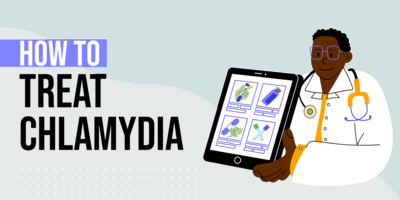
How to Treat Chlamydia
Chlamydia is a bacterial infection that is spread by sexual contact, according to the CDC. It is one of the most...
Read moreHelp patients book appointments with you on Solv. It's free!
13 instant-book locations


Help patients book appointments with you on Solv. It's free!
Chlamydia is a sexually transmitted infection that affects both men and women. According to the National Institutes of Health, chlamydia is one of the most common STDs (NIH).
Chlamydia is a bacterial infection spread through vaginal, oral, or anal contact with an infected person. If left untreated, chlamydia can cause significant damage to a woman's reproductive system, leading to infertility or fatal ectopic pregnancy, according to the CDC.
Many people with chlamydia have no symptoms and can inadvertently spread the disease to others, according to the National Institutes of Health. The CDC recommends abstaining from sex, using latex condoms, and being in a long-term mutually monogamous relationship with a partner who does not have chlamydia as the best ways to avoid contracting the disease. Many people with chlamydia have no symptoms and can inadvertently spread the disease to others, according to the National Institutes of Health. The CDC recommends abstaining from sex, using latex condoms, and being in a long-term mutually monogamous relationship with a partner who does not have chlamydia as the best ways to avoid contracting the disease.
Chlamydia is transmitted by unprotected sexual contact with an infected person. According to the Centers for Disease Control and Prevention, you can contract chlamydia even if your sexual partner has the STD and does not ejaculate during sexual intercourse. According to the CDC, if you are pregnant and have chlamydia, you can pass it on to your child during birthing.Chlamydia is transmitted by unprotected sexual contact with an infected person. According to the Centers for Disease Control and Prevention, you can contract chlamydia even if your sexual partner has the STD and does not ejaculate during sexual intercourse. According to the CDC, if you are pregnant and have chlamydia, you can pass it on to your child during birthing.
A chlamydia test is a laboratory test that looks for chlamydia bacteria in your body. According to the CDC, this test can be performed using urine or a swab.
The urine test is available to both men and women, however the swab test is only available to women. An STD test provider obtains a sample of cells using a little brush or cotton swab during a pelvic exam, according to the NIH.
Antibiotics are an easy way to get rid of chlamydia. For chlamydia therapy, the CDC recommends a seven-day antibiotic regimen. While this will stop the infection, the CDC advises that it will not be able to heal any damage caused by the illness. It also suggests that you refrain from sexual activity for at least seven days or until your chlamydia treatment is completed.
A chlamydia test is an STD test that can tell you if you have chlamydia or not. According to A chlamydia test is used to determine the presence of chlamydia bacteria in the body, according to the National Institutes of Health. It can be used to confirm whether you have chlamydia even if you don't have any symptoms. According to the National Institutes of Health, chlamydia symptoms include pain when peeing and frequent urination. It can cause abnormal vaginal bleeding in women, and it can cause discharge from the penis in men. the NIH, it can be done as a urine test or a swab test, albeit the swab test is normally only done on women. Many healthcare practitioners that provide lab test services can deliver a chlamydia test.
A chlamydia test is used to identify whether chlamydia bacteria is present in the body, according to the National Institutes of Health. It can be used to determine whether you have chlamydia even if you don't have any symptoms. According to the National Institutes of Health, chlamydia symptoms include pain when peeing and frequent urination. It can cause abnormal vaginal bleeding in women, and it can cause penile discharge in men.
A chlamydia test can reveal whether or not you have the STD and help you avoid infecting others. For sexually active women under the age of 25, males who have intercourse with men, HIV patients, and pregnant women under the age of 25, the National Institutes of Health recommends yearly chlamydia tests. This STD test is particularly recommended for women over the age of 25 who have had multiple sexual partners and whose partners have used condoms incorrectly or inconsistently.
According to the National Institutes of Health, the chlamydia test provider will ask you to urinate into a sterile collecting cup during the urine test. Lab technicians examine your urine sample for the presence of chlamydia bugs. According to the National Institutes of Health, a healthcare provider will use a swab or brush to collect a sample of cells during a pelvic exam. After that, the sample is transported to a laboratory for analysis.
According to the National Institutes of Health, lab test providers may advise women getting a chlamydia test to avoid using vaginal douches or lotions for at least 24 hours prior to the test. It's also possible that men and women will be asked to stop taking antibiotics for at least 24 hours before the STD test.
Symptoms of chlamydia usually show one to three weeks after infection, according to the University of Wisconsin. However, 75 percent of women and 50 percent of men with chlamydia exhibit no symptoms, according to the institution. The only way to find out whether you have chlamydia is to go to an STD testing center and take a chlamydia test. Symptoms of chlamydia usually show one to three weeks after infection, according to the University of Wisconsin. However, 75 percent of women and 50 percent of men with chlamydia exhibit no symptoms, according to the institution. The only way to find out whether you have chlamydia is to go to an STD testing center and take a chlamydia test.
You shouldn't test positive for chlamydia after you've done therapy. According to the University of Rochester Medical Center, chlamydia can be successfully treated with azithromycin or doxycycline. According to the University of Rochester Medical Center, people with lymphogranuloma venereum, a kind of chlamydia, may need 21 days of treatment. Furthermore, the institution recommends that you refrain from all sexual activity for at least seven days or until your chlamydia treatment is finished.
A chlamydia test is available at many healthcare facilities that perform lab tests and STD testing services, such as hospitals, urgent care centers, and walk-in clinics. Solv is one of the simplest and most convenient ways to locate chlamydia test providers in your area. Type "chlamydia test" or "STD testing" into the search field on Solv's website, then enter your location to find top-rated providers and arrange an appointment online.

Updated on Apr 25, 2024
Solv has strict sourcing guidelines and relies on peer-reviewed studies, academic research institutions, and medical associations. We avoid using tertiary references.
Annual Wellness Exam in Mooresville
Chickenpox Vaccine in Mooresville
DOT Exam in Mooresville
Ear Wax Removal in Mooresville
Eye Exam in Mooresville
Flu Shot in Mooresville
Hepatitis Vaccine in Mooresville
Measles Vaccine (MMR) in Mooresville
Pap Smear in Mooresville
Physical Exam in Mooresville
Shingles Vaccine in Mooresville
Sinus Infection Treatment in Mooresville
Sports Physicals in Mooresville
Tetanus Shot in Mooresville
Typhoid Vaccine in Mooresville
Well-Woman Exam in Mooresville
Yellow Fever Vaccine in Mooresville
A1C Test in Mooresville
CMP Test in Mooresville
Chlamydia Test in Mooresville
Diabetes Test in Mooresville
Gonorrhea test in Mooresville
H Pylori Test in Mooresville
HIV Test in Mooresville
Hepatitis test in Mooresville
Herpes Test in Mooresville
Mono Test in Mooresville
Pregnancy Test in Mooresville
STD Testing in Mooresville
Strep Test in Mooresville
Syphilis test in Mooresville
TB Test in Mooresville
Thyroid Test in Mooresville
Trichomonas Test in Mooresville
Vitamin D Test in Mooresville
Tips, advice, news—your resource to stay healthy and safe while improving your experience with healthcare providers when you need them.